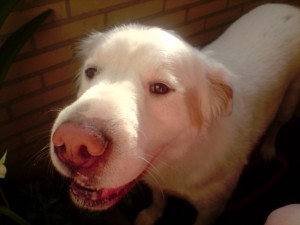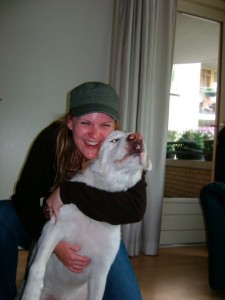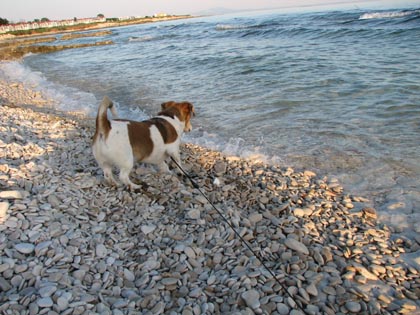You may not know this but my dog, Bodie, is an expat pet. We adopted him when we lived in Amsterdam in 2006, when we were the expats living in Holland. We’ve since moved back to Florida, and so its his turn to be the expat (expat is short for “expatriate”).
Bodie isn’t the only expat pet who likes to share his experience of traveling and exploring different countries.
Clogs and Tulips: An American in Holland recently scored an interview with expet Turner Jansen. Turner relocated with his parents to the Netherlands late 2008 and agreed to take the time to answer a few of our questions.
Clogs and Tulips: What brings you to the Netherlands?
Turner Jansen: My daddy is Dutch and after he and my mommy got married, my mommy and I moved to the Netherlands to live with my daddy. Originally, I come from the United States.
CT: What sorts of things needed to be in order for you to come into the Netherlands?
TJ: It was pretty easy, actually. All I needed in for entry into the Netherlands was a microchip or tattoo, a certificate of health from my veterinarian, updated shots, and an airline compliant travel crate. We had the microchip done at a Humane Society clinic, which really kept the price down. My parents opted to do everything themselves as opposed to going through a pet relocation agency. My daddy was on the flight with me and was there to pick me up at the baggage claim. Cheap and easy. One thing we didn’t do before relocation that I would recommend was get me a passport. We were able to get one from my new veterinarian here in the Netherlands with no trouble at all.
CT: What was the most challenging adjustment you had to make coming to the Netherlands?
TJ: The biggest challenge was getting used to all the bicycles. I still find bicycles terrifying. My mommy keeps trying to teach me how to run along side the bike, but they’re just so scary! I always have to be reminded of where the bicycle paths are – they look like sidewalks still to me. A very dangerous mistake when you have a fear of bikes. (AndASmallDog Note: Bodie is also afraid of bicycles – but luckily got in the habit of ignoring them!)
CT: Was it easy to find a good veterinarian, groomer, and pet hotel? Is language an issue?
TJ: My mommy joined the International Women’s Contact Utrecht right away after we moved and was able to ask some of the other members for recommendations. I feel about the vet like I hear most humans feel about the dentist, but luckily, we found a really good one. My mommy communicates with him mostly in Dutch, but he’s able to explain more complex things in English and is more than happy to switch over if my mommy needs it. I’ve had two appointments so far and, although they speak Dutch to my mommy, they speak in English to me, which really helped me relax a little. My vet takes care of my nails and my parents do the rest of my grooming, so finding a groomer wasn’t necessary. Again, the vast majority of the Dutch are very versatile in English, but I would recommend learning as much Dutch as you can.
The first pet hotel I stayed at, my parents found on their own and we didn’t like it at all. The second one we tried was recommended by a friend of my mommy’s from the IWCU and we really love it. They also speak reasonable English.
CT: Can you talk about some of the major differences between the US and the Netherlands?
TJ: Here in the Netherlands there are special dog toilets and dog play areas. There are also designated areas where dogs can run free. These dog areas are cleaned by the city, so you don’t have to worry about cleaning up after your dog (all dog owners pay a dog tax to maintain these areas). What’s really frustrating is the number of people that allow their dogs to relieve themselves in restricted areas – playgrounds, sidewalks, etc – and don’t clean up after them. In the US, I was only allowed into a very limited number of places but, in the Netherlands, I can go almost everywhere: restaurants, cafes, stores. As long as there’s no sign depicting a dog inside a red circle, I’m allowed in.
When my uncle was visiting, my mommy and I went with him into a really fancy men’s clothing store and nobody even noticed that I was there! I can also travel on trains, busses, the metro, and trams… as long as I have a ticket. The best part is that every restaurant has its own cat to keep the mice at bay. I love going out to lunch with my parents and rubbing elbows with the restaurant cats. What I miss most about the US are the large yards that most homes have to run around free in. We try to go to the woods nearby as often as possible so I can run out all of my energy.
CT: Thank you so much for taking the time to talk to us. Are there any last words you have to share with our readers?
TJ: It was my pleasure. What I would say to anyone planning on taking their pet abroad with them is to do whatever you can to make the transition easy on your pet. Let them get used to their travel crate before your departure and make sure there is plenty of water place and familiar items in the crate: a blanket and maybe a soft toy. Set into a routine right away so that your pet knows what to expect. Take your pet around the neighborhood so they can get used to their new surroundings. Have familiar things around your new home like furniture pieces, blankets, rugs, and toys so that not everything is brand new. The Netherlands is a great place to raise a pet!
Tiffany Jansen moved to the Netherlands in December 2008 with dog in tow after marrying a Dutchman. She runs her own company Little Broadway and does some freelance writing on the side. You can read more about her adventures as an American expat in the Netherlands on her blog Clogs and Tulips: An American in Holland.
If anyone is interested in reading more about living abroad, especially in Holland, please do check out Tiffany’s great blog!
Thank you to both Tiffany and Turner for your great insight!




{ 2 comments… read them below or add one }
I lived in Amsterdam for 2 1/2 years- loved it!
This is a great post! We’re taking our two dogs with us to Europe in July so I am reading through your back posts on dog-friendly destinations in Europe. You didn’t happen to go to Croatia, did you?